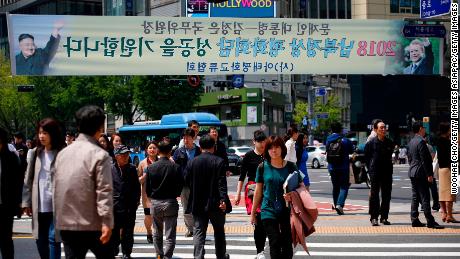North Korean defectors say unification requires closing a cultural chasm
Seoul, South Korea (CNN)When Ken Eom first arrived in South Korea, he had to get used to hearing a lot of stupid questions.
"Is there alcohol in North Korea?" people would ask the former North Korean soldier, who defected in 2010, aged 29. "If people were so malnourished, and couldn't get rice, why didn't they just eat ramen?"
The experience was alienating. It was "like they thought I was from an Amazon tribe," he told CNN at a school for defectors in Seoul, the questions just one of many daily challenges which made integrating into South Korean society so difficult.
Now, a historic meeting between North Korean leader Kim Jong Un and South Korean President Moon Jae-in has brought the Peninsula closer together than it has been in years.
And if the two Koreas are able to pull off the incredible feats of signing a peace treaty and making genuine progress toward denuclearization, unification, once unthinkable, appears a less distant prospect.
But the chasm Eom feels with his southern compatriots, almost nine years after making the hazardous journey, shows that the matter of unification, and what it means for people on both sides of a border far stronger and less permeable than the Berlin Wall ever was, remains unclear.
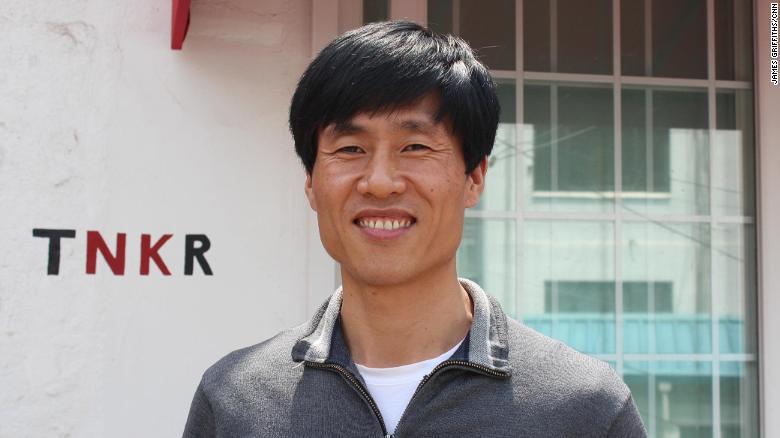
Ken Oem, a 37-year-old North Korean defector, poses in front of the Teach North Korean Refugees building in Seoul, South Korea.
Wide gap
Eom's school, a white and red building which houses the global education center for Teach North Korean Refugees (TKNR), lies at the end of a small alley in Seoul's western Mapo district, up some stone steps and partially hidden by residents' washing lines.
The nonprofit focuses on providing free English lessons for North Korean defectors, one of several organizations filling in the gaps for those who have come from the North and discovered themselves adrift in an alien South Korean society.
Over 70 years of separation has left the two Koreas with a rapidly widening cultural gap that can leave North Korean defectors -- who often arrive in the country alone, without family or friends to support them -- feeling alienated and confused.
"When I first came to Seoul, I worked on a manufacturing site," Eom says. "At that time I did not speak English at all, not even one word."
It never occurred to him that would be a problem, given the nature of the job. "We had to match the colors of plastic material, but even though all those people were Korean, they never said the color if Korean, always English words -- red, blue, white -- what is red? What is blue? I felt really desperate and depressed."
Founded in 2013 by American Casey Lartigue and South Korean Eunkoo Lee, TNKR has helped hundreds of North Koreans learn English. Eom was once a student at the center and now acts as a special ambassador and adviser to other refugees.
"I wanted to learn English so I could give public speeches," he said. "I felt like I could maybe help other (refugees) and be a model of a successful North Korean."
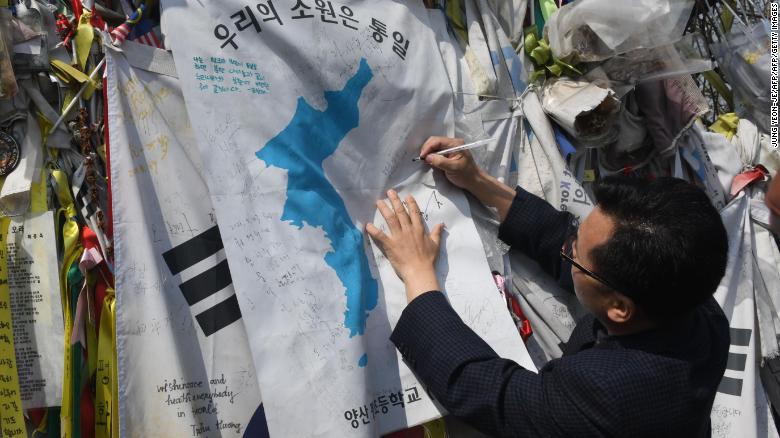
A man writes an inscription calling for peace and reunification on a "Unification flag" hanging at a military fence at Imjingak peace park in Paju near the demilitarized zone dividing the two Koreas on April 26, 2018.
'Out of a time machine'
Travis Jeppesen, author of "See You Again in Pyongyang" and a longtime North Korea watcher, said while dreams of reunification "might still be optimistic," in the wake of the Kim-Moon summit, "perhaps now is the moment to begin seriously considering the alternative of reconciliation."
"(There needs to be) an acknowledgment of the vast differences that have emerged in the two societies since the division began in 1945, and a willingness to work together to overcome them," he said.
Sokeel Park, the Seoul-based director of research and strategy at Liberty in North Korea, a defector assistance group, said for many refugees, "transitioning from North Korea to South Korea, especially if you're from a provincial town in North Korea, is like coming out of a time machine into the future."
The South Korean government currently provides North Korean defectors with $6,450 in the first year, as well as vocational and other training. This is supplemented by NGOs, who spend thousands of dollars helping each refugee. Even then many North Koreans in South Korea struggle to get employment and live close to the poverty line.
If integrating North Koreans into South Korean society one at a time is hard, the task of full reunification seems next to impossible.
"For a lot of young South Koreans, the idea that we are one with the North Korean people is becoming a kind of ancient fiction or myth," said Park. Most are "basically happy living separate" and unwilling to face the huge costs of reunifying with North Korea.
Estimates of the cost of reunification to South Korea range from around $500 billion to several trillion dollars, and putting even that specific a price on it is difficult, given the impossibility of guessing how the process would play out.
"We really haven't had this debate on a formal level for years," said Wol-san Liem, director of Korean Peninsula affairs at the Korean Public Service and Transport Workers' Union (KPTU). "What happens in terms of unification? A state system? The Kim Dae-jung model was a federal system, I think that now has to be brought up and talked about again."
She said some are now talking about a potential two state system -- "separate but equal countries with good relations" -- that would once have been unthinkable.
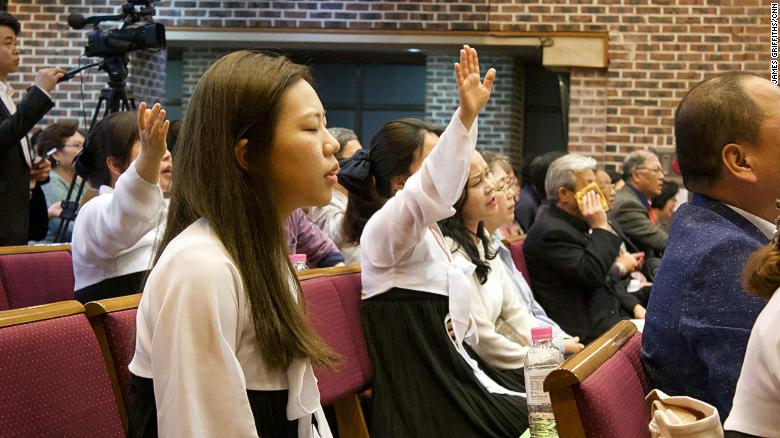
North Korean refugees sing and pray during a church service in Seoul, South Korea on April 28, 2018.
Praying for the future
While many South Koreans welcome warming ties between the two countries, deep suspicion of Pyongyang's intentions and hostility to the Kim regime remains, not least among the small but substantial community of defectors living in the South.
On Saturday, at a large Methodist church on the outskirts of Seoul, children played in the lobby and organizers handed out press releases as North Korean refugees shared their stories and prayers with the hundreds of defectors who had gathered inside.
Christians make up a small but very vocal minority of the tens of thousands of defectors living in South Korea, with many brought to the country by evangelical organizations, who help them make the dangerous journey from the North.
One woman spoke of being trafficked to China, where she became pregnant, before being able to make it to the South with the help of Christian organizations.
"As I gave birth in China, I thought a lot about you," she said in a letter to her mother read aloud to the congregation. "Only then could I know how much it hurt to be a mother."
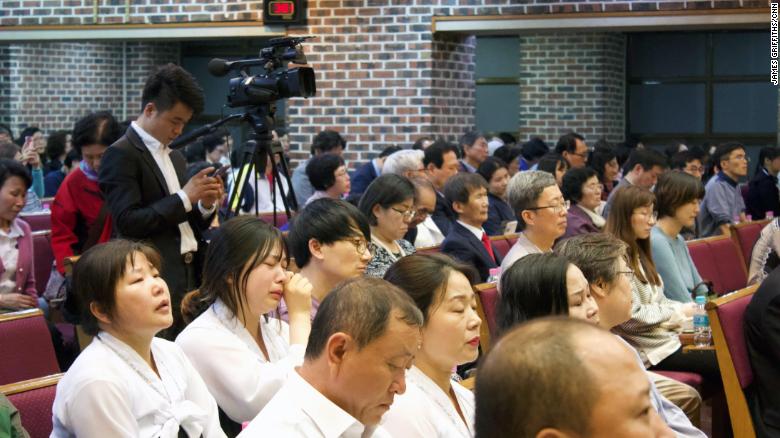
A North Korean refugee cries as she listens to a woman read a letter to her parents at a church service in Seoul, South Korea on April 28, 2018.
Her testimony left many in the audience in tears, others broke down as the congregation prayed and sang at the direction of a pastor.
"The day I received your call and was able to send you some money, I cried like a mad woman," the woman said. "Will we ever be able to have a meal together? All I can do is sit and pray."
Some of those gathered at the church were highly critical of the talks at Panmunjom on Friday, and of the South Korean government for being "taken in" by Kim Jong Un.
"Even though the two leaders sat down together and negotiated, nothing has changed for the people in North Korea," said Kim Bo-bin, 37, who came to South Korea seven years ago. "If unification can take place from just a summit, it would have happened decades ago."
Not all in attendance were negative however. Song Chul-min, 27, who defected in 2010, said it was "really good to see" Kim Jong Un crossing the military demarcation line between the Koreas.
"I have hopes for things to open up a little, for example with the economy," he added. "So there will be more interaction between here and the North."
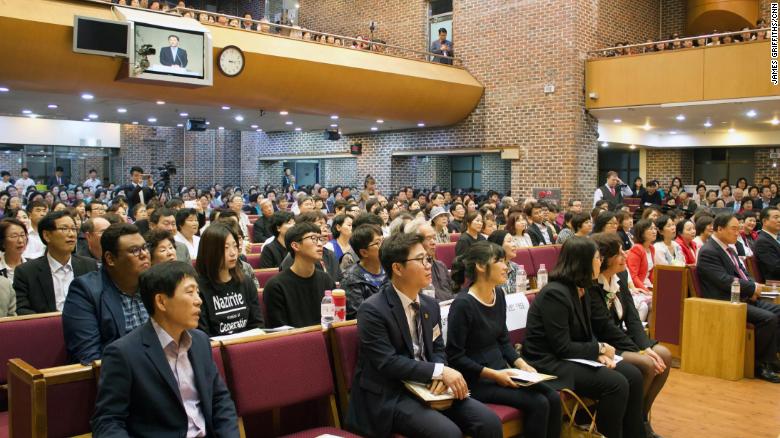
North Korean defectors listen to a pastor during a church service in Seoul, South Korea on April 28, 2018.
Economic integration
Just what kind of interaction there could be remains to be seen.
Moon served in the government of Roh Moo-hyun, who continued the "Sunshine Policy" launched by his predecessor, Kim Dae-jung, for which Kim won the Nobel Peace Prize in 2000. That saw Seoul provide millions of dollars in economic aid to Pyongyang, and open the Kaesong Industrial Park north of the border to help improve economic ties.
Under the Panmunjom Declaration signed by Moon and Kim, the two vowed to "promote balanced economic growth and co-prosperity of the nation."
As a first step, they agreed to promote the "connection and modernization of the railways and roads" between the countries, and establish a joint liaison office in the Kaesong region.
KPTU's Liem said a railway link through North Korea, giving the South a path to China and the Eurasian continent could have huge economic benefits for both countries.
"The big dream is we connect the railways, connect to the trans Siberian raill way and go all the way to Europe," she said, but she warned any further economic integration may be far harder, and without such obvious benefits.
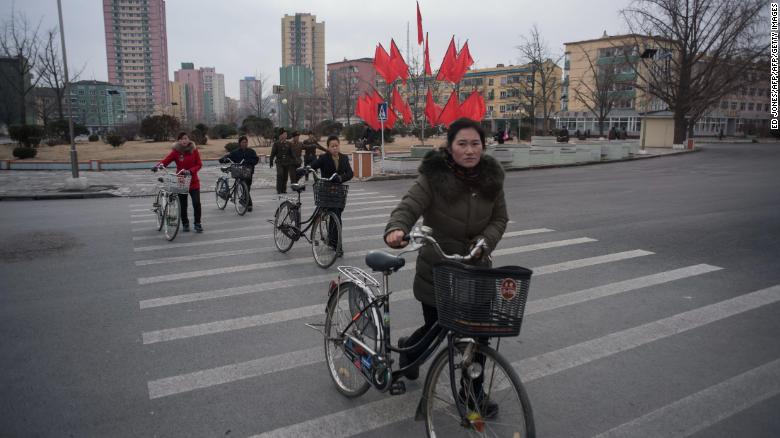
Cyclists cross a road in Kaesong, North Korea. A joint industrial complex once run in the city by the South and North Korean has been considered a possible model for future ties.
Economically disadvantaged North Korea, cut off from the world by decades of sanctions, would always be the weaker partner to the South, and there are fears this could lead to South Korean corporations and private interests running roughshod over their northern neighbor.
"Kaesong was essentially South Korean capital exploiting cheap labor from North Korea," Liem said. "Even now North Koreans who come to South Korea are working in the worst jobs for the lowest wages."
A sudden flood of cheap labor could negatively effect South Korea too, driving down wages and allowing employers to cut benefits.
"There has to be some way to work for the collective improvement of working conditions in North and South Korea," she said. "Otherwise it's going to be a huge race to bottom."
Eom was more optimistic, saying even limited economic exchanges could help open up North Korea and lead to reform.
While he was skeptical about Kim Jong Un's motives, he said the leader's ability to control what ideas spread into North Korea would be limited, even in tightly controlled environments like the Kaesong Industrial Complex.
"During the work they might get some information about South Korean culture, and the outside world. They are human, not machines," he said. "Humans learn many things during the work."
CNN's Sol Han contributed reporting.
News Courtesy: www.cnn.com

